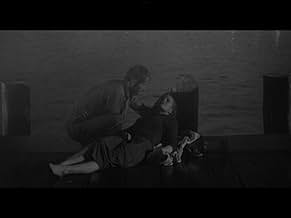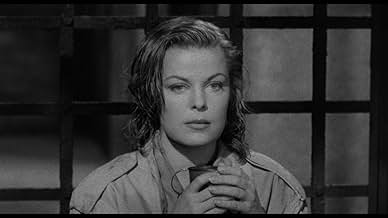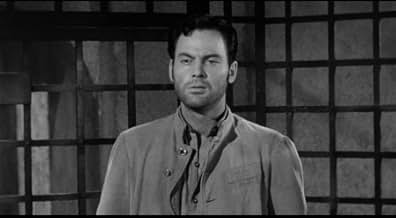AVALIAÇÃO DA IMDb
6,5/10
360
SUA AVALIAÇÃO
Adicionar um enredo no seu idiomaA condemned murderer, scheduled to hang in the morning, asks for the company of a woman in his final hours.A condemned murderer, scheduled to hang in the morning, asks for the company of a woman in his final hours.A condemned murderer, scheduled to hang in the morning, asks for the company of a woman in his final hours.
- Direção
- Roteirista
- Artistas
Avaliações em destaque
I would love to see a Hugo Haas festival. At a theater or on television. If anyone was an auteur, it was Haas. His movies are similar to but better than those of Ed Wood. They are below the standards of some other contemporaries. But they seem to have been shot with little money.
Here we have a brunette Cleo Moore and Death Row inmate John Agar. She is a self-described "pickup girl." She looks it, too. It's very sleazy -- as it is meant to be.
This basically two-character piece was ahead of its time. I can imagine it with Al Pacino and Edie Falco.
Here we have a brunette Cleo Moore and Death Row inmate John Agar. She is a self-described "pickup girl." She looks it, too. It's very sleazy -- as it is meant to be.
This basically two-character piece was ahead of its time. I can imagine it with Al Pacino and Edie Falco.
John Agar is about to be executed for murder. It's his last night, and he can have anything he wants. He asks for a woman to spend his last night on earth with him. He winds up with Cleo Moore, who has just been rscued from trying to drown herself in the river.
Hugo Haas has written a very interesting two-player drama. He cast his frequent star, Cleo Moore, and for some reason, John Agar. It's an hour of their talking emotionally. Unfortunately, neither is particularly convincing nor interesting.
Has spent about a dozen years writing, producing, and directing his own movies. When he was finished, he sold them to a distributor -- here it's Universal -- and move onto the next. Generally they were dark, gloomy noirs, variations on other pictures that went in some unexpected direction. Had he gotten better actors, this could have been a very good movie. Alas, as it is, it's more interesting for the idea than the execution.
Hugo Haas has written a very interesting two-player drama. He cast his frequent star, Cleo Moore, and for some reason, John Agar. It's an hour of their talking emotionally. Unfortunately, neither is particularly convincing nor interesting.
Has spent about a dozen years writing, producing, and directing his own movies. When he was finished, he sold them to a distributor -- here it's Universal -- and move onto the next. Generally they were dark, gloomy noirs, variations on other pictures that went in some unexpected direction. Had he gotten better actors, this could have been a very good movie. Alas, as it is, it's more interesting for the idea than the execution.
This is my favourite performance from the otherwise rather sterile John Agar. He is "Joe", on death row having been found guilty of strangling three women. He's decided to go out in Garbo style, wanting to be alone and angrily resisting any attempts from his family, or the priest, to comfort him as the big day nears. With twenty-four hours to go, though, he decides that the "company" of a lady might help ease his burden and obliged to help him out, the prison manage to recruit "Dora" (Cleo Moore). Now she's not in a very good place either - indeed had earlier tried to jump in the river; so a few dollars for a quickie with "Joe" didn't seem such a bad offer. Whilst there is certainly a predictability about the latter portion of this drama, it's still performed well and is tautly directed by Hugo Haas. Moore delivers an impassioned effort, indeed in many ways her character is far more intriguing than the sorry-for-himself "Joe". It is a bit dialogue-heavy, but for the most part that dialogue is worth listening to as we head towards the expected denouement - expected on just about every level. It does sail perilously close to melodrama at times, but it has a compensating grittiness and realism that I felt made this a much better than average tale to tell. You probably won't remember it for long afterwards, but it's enthralling enough when you watch.
John Agar himself has said (in an online chat hosted by Turner Classic Movies) that this was a "very strange" movie. Strange yes, but also intriguing in a low-budget sort of way.
Of course, the film is a retread of the old hooker-with-a-heart-of-gold romantic fantasy. (A much more recent example: "Leaving Las Vegas.") The Cleo Moore character, who agrees to spend the night with Agar, isn't actually identified as a prostitute, but we get the idea. We also know that the more time these two tormented souls spend together, the more they will get to know each other, and themselves, with a generous helping of psychobabble along the way.
But once you get past the obviousness of the film's rather incredible premise, not to mention a mawkish opening theme song, things get interesting in this modest, offbeat Hugo Haas opus. Moore and Agar deliver performances that are sincere, if at times a bit theatrical - he plays a condemned man who's mad at the whole world; she plays a suicidal woman who, despite her despair, is still capable of hope. Some of Moore and Agar's scenes together are nicely played out in long, continuous takes.
Unfortunately, the movie is nearly ruined by a frustrating, unresolved ending. Haas may have been trying for some kind of dramatically suspended moment, but it makes you want to yell at him: Tell us what happens next!!!
Of course, the film is a retread of the old hooker-with-a-heart-of-gold romantic fantasy. (A much more recent example: "Leaving Las Vegas.") The Cleo Moore character, who agrees to spend the night with Agar, isn't actually identified as a prostitute, but we get the idea. We also know that the more time these two tormented souls spend together, the more they will get to know each other, and themselves, with a generous helping of psychobabble along the way.
But once you get past the obviousness of the film's rather incredible premise, not to mention a mawkish opening theme song, things get interesting in this modest, offbeat Hugo Haas opus. Moore and Agar deliver performances that are sincere, if at times a bit theatrical - he plays a condemned man who's mad at the whole world; she plays a suicidal woman who, despite her despair, is still capable of hope. Some of Moore and Agar's scenes together are nicely played out in long, continuous takes.
Unfortunately, the movie is nearly ruined by a frustrating, unresolved ending. Haas may have been trying for some kind of dramatically suspended moment, but it makes you want to yell at him: Tell us what happens next!!!
First, this is not a film noir, nothing to do with crime, but a noir drama, yes, of course, how could it be otherwise? Director Hugo Haas is a film maker whose filmography should be discovered again. After a brief European career, before he escapes from Nazis, he went to the USA and began a second part. And he never made something different from drama. All those films are rather gloomy, desperate, forget any happy ending - as far as I know. All those films involve women - more or less fatale chicks - and engrossing plots, gripping, for not too long films. His films are nearly all alike but who cares? I definitely like his films.
Você sabia?
- CuriosidadesHugo Haas - who wrote, produced, directed and acted in most of his movies - doesn't appear in this film.
- ConexõesReferenced in O Degenerado (1969)
- Trilhas sonorasHold Back Tomorrow
Music by Franz Steininger
Lyrics by Johnny Rotella
Arranged and Conducted by Les Baxter
Principais escolhas
Faça login para avaliar e ver a lista de recomendações personalizadas
- How long is Hold Back Tomorrow?Fornecido pela Alexa
Detalhes
- Data de lançamento
- País de origem
- Idioma
- Também conhecido como
- Hold Back Tomorrow
- Locações de filme
- Empresa de produção
- Consulte mais créditos da empresa na IMDbPro
- Tempo de duração1 hora 15 minutos
- Cor
- Proporção
- 1.37 : 1
Contribua para esta página
Sugerir uma alteração ou adicionar conteúdo ausente















